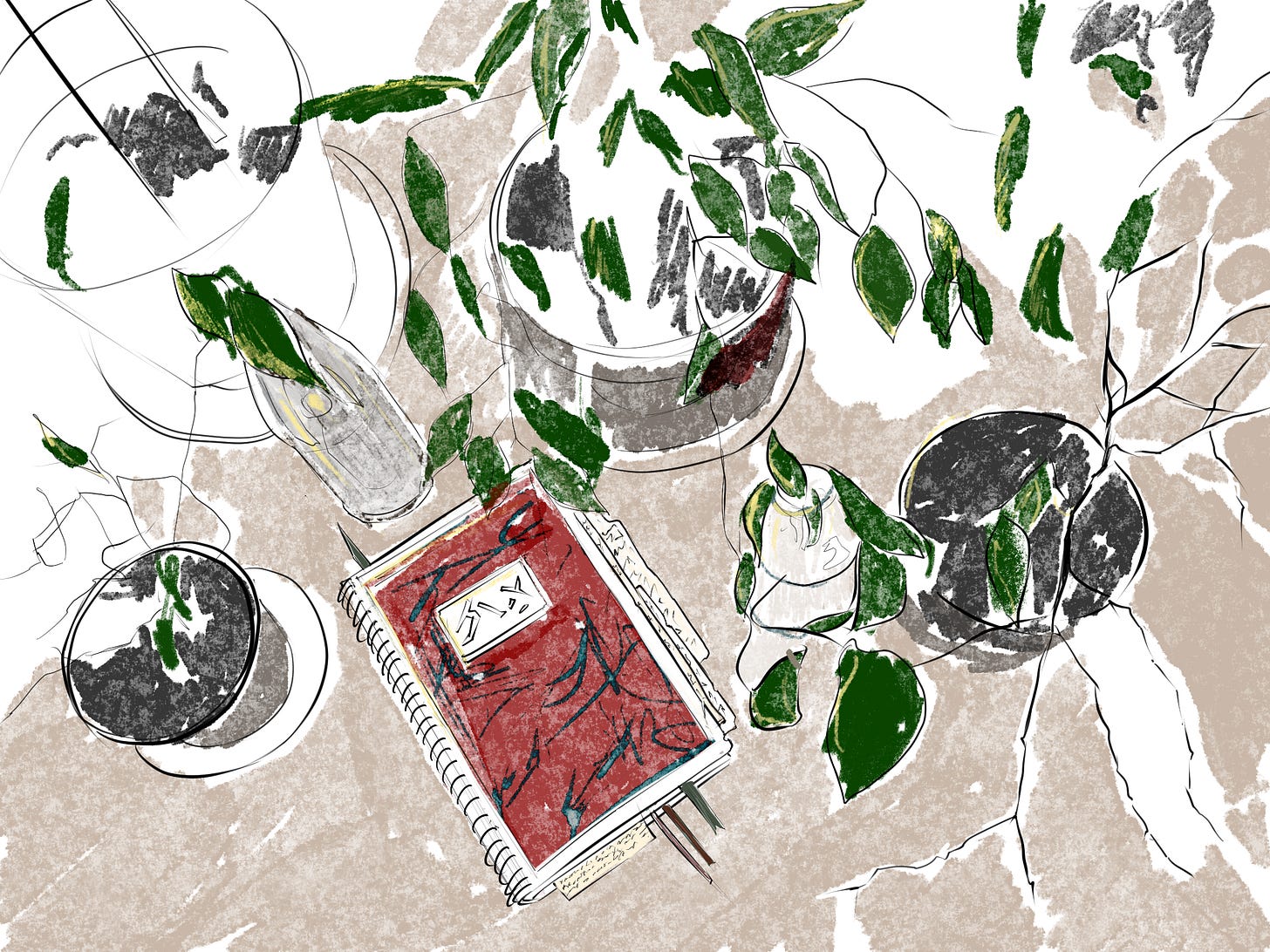No one greeted her at the door, which was expected but perhaps a disappointment. She had felt animated by the spirit of being on a mission, and to return home to the same indifferent entrance let the air out of her a little. But as she stepped in she smelled a stew, which was a rare luxury, and probably meant her mother was expecting her to arrive home shortly. It was a reticent and distant woman’s way of saying thanks.
In sharp contrast with the imposing exterior, the inside of her home was as inviting as she could imagine. Her father had labored for hours, when she was young, to cover the walls in fake wooden siding he had scavenged from an abandoned hardware store. Her mother had expressed understandable exasperation at his willingness to devote himself to everything but what was really necessary, but years later, Haojing admitted to herself that the effort had been worth it. Though it peeled and sagged all over, the paneling made a cold set of walls much warmer.
The house was its usual chaos of furniture and clothes, the guts of old electronics splayed out on a repurposed kitchen island, toys for the younger children. A few of them wandered through the house, giving her cursory waves. There were usually a dozen people living at the house at any one time, her and her mother and brothers and cousins and children who called themselves cousins. Though Haojing knew each from each, several of the children did not know who was their sibling and who was their cousin, nor did they particularly care. Her mother’s sister lived some ways up the road, and through a kind of telepathic connection they would take on care for children they knew or didn’t, depending on the season and their workload and health. Between the two of them – and, increasingly, Haojing and her eldest brothers – they cared for a sizable portion of the village’s children. Despite it all, Haojing had always been the only girl in the younger generation.
She passed through a living room which had once been a conference room, where a mount for a giant TV, long since scavenged, still hung from the wall, rusting and pointless. A younger cousin sat swaddled up on a couch, clutching a tablet, its screen casting his little face with a bit of blue glow. She resisted the urge to go over and tousle his hair; tablet time meant he was ill, and these days there was no such thing as a minor illness.
She walked past the broad industrial staircase that led upstairs to the big nursery where younger children still stayed, her mother’s room, and her father’s old workshop, the only place in the house still generally forbidden to her. She navigated through the narrow pantry that led to the kitchen, sidestepping a 7-year-old who came barreling through with a model plane in his arms. She took a moment to glance at the flower pots sitting on the pantry counter, which sat under grow lights that consumed precious energy. From the pots sprouted a few sickly beans. These were her mother’s experiments – “right pot test, left pot control,” Haojing whispered to herself, a mantra drilled into her head again and again as a younger teenager. There were no sure things in agriculture, anymore, so her mother had experimented religiously for over a decade, her findings kept in an old spiral notebook, locked in hand-drawn spreadsheets, her most treasured possession. It would be time to harvest from their garden soon, and they would live or die based on the knowledge secured in that notebook.
Her mother was seated at the kitchen table, facing away from her, with a cousin seated patiently right in front of her. The table had once been a massive barn door, which her uncle, long dead, had cut down and sanded and stained and bolted to two saw horses. At mealtime it would be the site of extraordinary activity, an orderly chaos of little hands and precious dinner ware and impatient mouths, but today the kitchen was remarkably quiet. She entered and stood quietly nearby, waiting. Her mother picked meticulously through her cousin’s hair, using a dog’s brush as a lice comb, occasionally muttering to herself in Mandarin. Her patient sat quietly and uncomplaining; there were fights and messes and screaming in this house, but in Chien-yi’s presence, there was only quiet obedience. Haojing observed it herself in hovering silently behind her mother.
Not looking up from her work, she finally spoke.
“Is he alive?”
Wordlessly, Haojing pulled the USB case from her bag, removed the drive, and placed it on the table in front of her mother. She glanced down at the drive, but did not stop her task.
“Did he want anything in return?”
“The data. Just Long Fei’s data.”
Chien-yi snorted.
“That sounds about right.”
She stopped combing, then shifted slightly towards Haojing, her voice softening.
“How did he look?”
“Not well. He was sober, at least.”
Chien-yi nodded.
“He was a good friend, once.”
She patted her charge on his shoulder.
“Off with you, now. Go on.” She kissed him quickly on his forehead as he pivoted in his seat and ran off. She shifted in her seat, looking at Haojing for the first time. She reached over and grabbed Haojing’s hand, giving it a squeeze, which Haojing knew to be the only sign of gratitude she would receive. She’s getting sentimental on me, Haojing thought.
“How was the trip?”
Haojing grabbed a chair, pulling it towards her, and sank into it, letting herself go in front of her mother out of exhaustion.
“The trip out was fine. The road back was…. I found someone in trouble. I helped him. It was a little hairy, but it was fine.”
Chien-yi rocked in her seat a little, a sure sign she was unhappy, but said nothing.
“It was fine. I’m fine. I’m home.”
Her mother picked up the USB drive.
“A script?”
“Yes. An injection. It’ll go straight through his hub. He thinks it’ll stabilize the implant very well.”
Her mother looked up at her, brows furrowing. Haojing found herself, for the thousandth time, unable to hold her mother’s gaze.
“So? What aren’t you telling me?”
Haojing again tried and failed to meet her mother’s gaze. She looked down at her feet and told her everything she remembered, speaking quickly, telling her mother that Long Fei had become immobile, possibly for good. When she finished speaking, she knit her fingers together and fought back the urge to say more. For a long while her mother said nothing.
“But he must be able to move,” she said quietly, to nobody. “Oh, my poor boy.”
She shook her head brusquely, and stood.
“Well, that’s how things will be. We’ll find a way. I need to go tell him, and we need to run that script.”
Haojing rose too.
“Can I – can I come with you? When you tell him?”
“Yes. Yes, OK.”
They walked together, wordlessly, up the stairs to Chien-yi’s room, which had in recent months become Long Fei’s room as well. They entered quietly. Even after all these years, to enter her parents’ room – her mother’s room, she said to herself – felt like entering a forbidden place. Light streamed in from a gap in the “curtains,” a repurposed blue tarp hung from a length of rope tied above the broad unopenable window. Next to her mother’s large bed, on a cot she herself had slept in many times, lay Long Fei. He looked even paler than when she had left a few days ago, spasming in his sleep. Chien-yi knelt down beside him, drawing a cloth across his forehead to soak up the sweat. Finally, she shook him awake.
He looked up at his mother with a dreamy, far-off look, his mouth drooping slightly to one side. She reached down and took his hand and began to speak. Haojing sunk down, sitting on the edge of her mother’s bed. Suddenly, she was filled with guilt; she should not be here to hear this. She had felt entitled, before, having gone on the journey herself. Now she felt like an intruder. She sat unmoving, listening to the murmur of her mother speaking to Long Fei, giving him bad news. From deeper in the house she could hear the noise of the gas generators sputtering to life, and for the first time she could remember, she was glad it was there.



